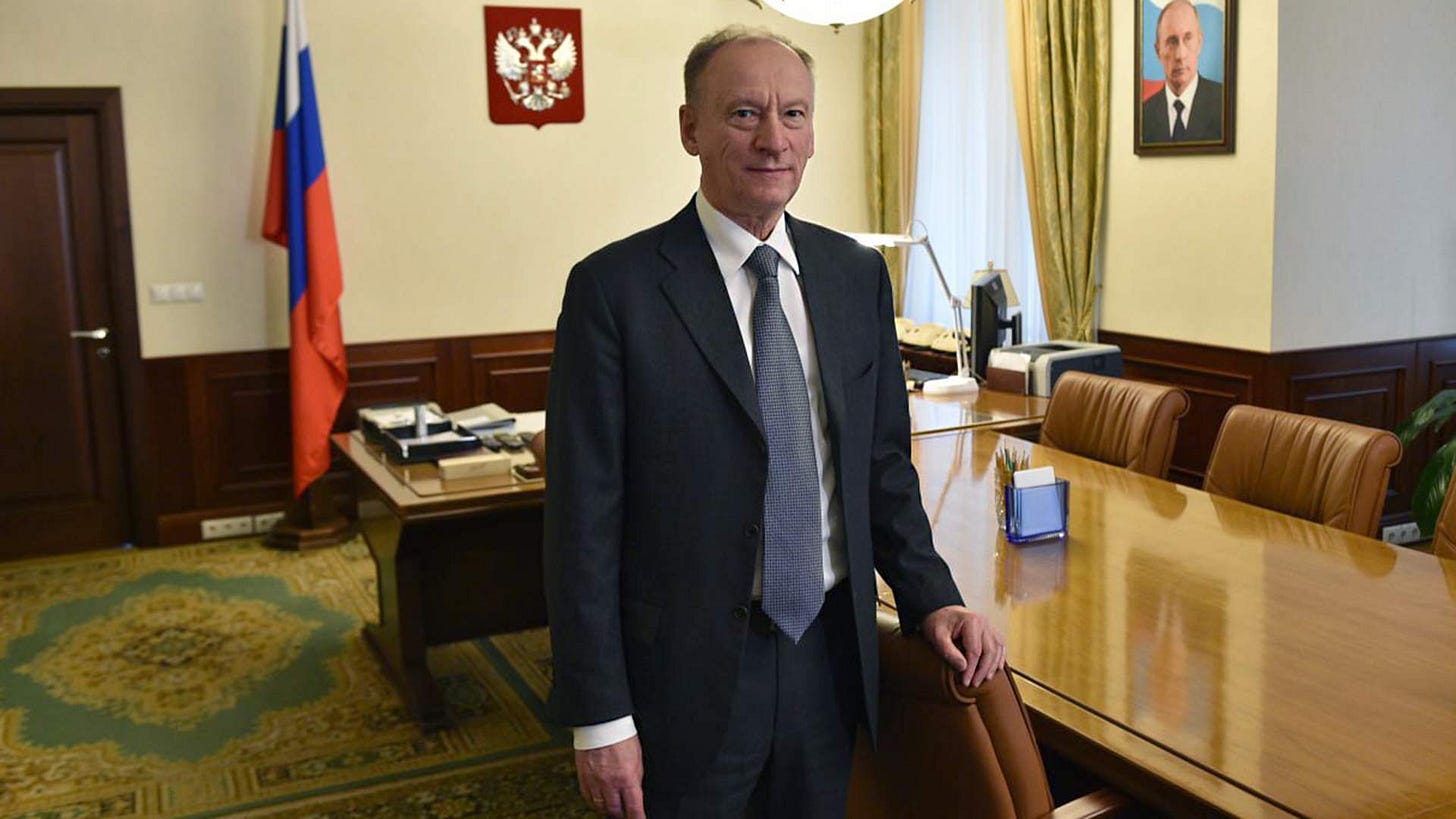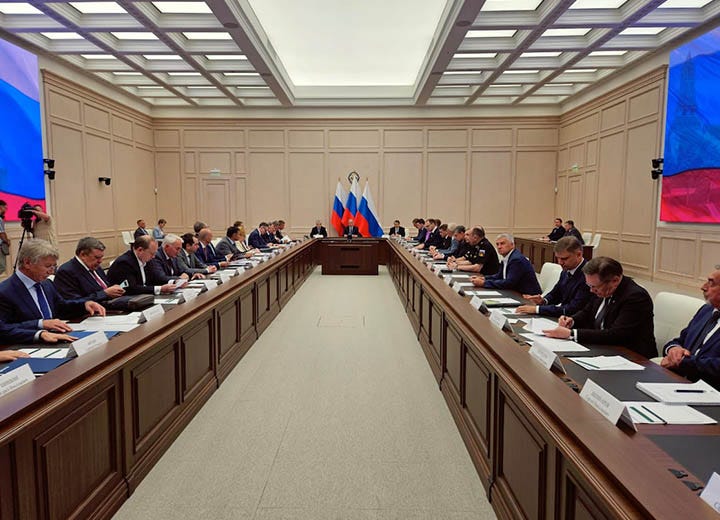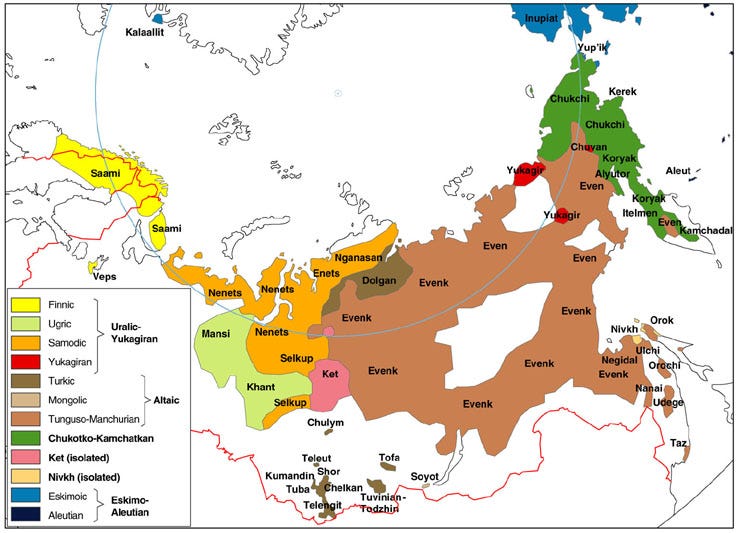In now familiar fashion, Russia’s ruling elite has gifted itself yet another national security body. Signed into being by President Putin in mid-August, the Russian Maritime Collegium (Морская коллегия России) will integrate three councils: One for the ‘strategic development of the Russian Navy’, one for ‘the protection of Russia's national interests in the Arctic’, and one for the ‘development and provision of Russia's maritime activities.’
This newest round of institutional reshuffling is remarkable for several reasons.
For one thing, the Maritime Collegium will be headed by Nikolay Patrushev, the notorious former director of the FSB and secretary of the Russian Security Council - a post that, in the words of Mark Galeotti, is the “closest thing there is in the Russian system to a national security adviser.”
Photo: Nikolay Patrushev in his office in August (Source: Izvestiya)
Patrushev is a long-standing associate of Putin’s. Over the years, he worked up a reputation as Russia’s most hawkish of hawks. Patrushev’s personal brand of ideology is grounded, according to Ilya Matveev, in “imperial nationalism with a paranoid conspiracy streak.” He helped lay the ideational foundations for the 2014 annexation of Crimea, as well as Russia's 2022 assault on Ukraine. Patrushev was instrumental in convincing Russian citizens that the true geopolitical intention of the ‘collective West’ was to weaken and dismantle the Russian state - through colour revolutions, intelligence operations, or the undermining of the country's societal makeup through an allegedly duplicitous promotion of human rights and democracy. Patrushev’s son, Dmitry, is one of the most prolific princelings of Putinist Russia. He currently serves in the government as Deputy Prime Minister, and has been flouted as a possible presidential successor.
Unlike his mercurial son, however, Patrushev Sr. has recently lost much clout within the higher echelons of Russian power. In May, Putin swapped his beleaguered defence minister, Sergei Shoigu, for Andrey Belousov, a seasoned economist, loyalist and technocrat. Belousov has been asked to regear Russia’s economy towards persisting in a possible long-term war of attrition against Ukraine. Shoigu, in turn, was moved to Patrushev’s seat as Secretary of the Security Council. Patrushev - who first elevated the Security Council to its current status as the de facto nerve centre of the Russian security apparatus - was made a Presidential Aide for Shipbuilding. Perhaps a consequence of Patrushev’s failure to accurately inform Putin about the extent of Ukrainian military capabilities in the lead-up to the 2022 invasion, this change of post was viewed by insiders in Moscow as a heavy demotion. The more recent naming of Patrushev as head of the Maritime Collegium might therefore best be seen as a way for Putin to sweeten a bitter pill given to a loyal henchman.
But while the appointment should certainly be understood as a degradation for Patrushev the person, Putin’s decision to move a prominent, bellicose silovik onto a maritime security posting indicates to what degree the oceans, and especially the Arctic, have become central to Russia’s military planning.
One of the three councils of the new Maritime Collegium will be focused exclusively on Arctic policy, a special status not afforded to any of the other naval theatres of interest to Moscow. The presidential decree that established the body also abolished the Security Council's interdepartmental commission on issues of ensuring Russia's national interests in the Arctic. Its functions have been transferred to the Collegium, meaning that Arctic policy discussions will now likely primarily be held under the new body’s auspices - even as, of course, final shots will still be called by Putin himself.
Given Patrushev’s track record, Russia’s Arctic policy stance can be expected to harden in the coming months. Since the launch of its invasion of Ukraine, Russia’s Arctic posture has oscillated between performative overtures to resume Arctic Council cooperation (in exchange for a rollback of sanctions, bien sûr) and defiant grandstanding against the western Arctic states.
Patrushev should be seen as an advocate of the latter. In an interview given to Izvestiya a day after his appointment, he bemoaned the ostensible Western “militarisation” of the Arctic, as well as sanctions against Russian commercial entities. He implicitly linked American policy on the Arctic to the U.S.’ “anti-Russian and anti-Chinese Indo-Pacific policy,” which Patrushev believes requires an “increase of [Western] naval presence in geopolitically significant areas of the world oceans,” including in “seas adjacent to the territory of the Russian Federation.”
The recently acquired habit of Putin and Co. to name the Arctic and the Indo-Pacific in one breath (most recently on the sidelines of the “Okean-2024” exercise) is likely a friendly wink to China. For Beijing, access to the Russian-controlled Northern Sea Route represents a possible escape from strategic maritime encirclement by the U.S., as well as the famed Foster-Dullesian ‘island chains’. China’s naval engagement in the region, including the Polar Silk Road (冰上丝绸之路), has long been seen as a reasonably important part of its overall maritime strategy.
Photo: The first session of the Maritime Collegium, 27 August (Source: marine.org.ru)
The Maritime Collegium convened for the first time in late August. It is made up of fifty-two permanent members (with more to be added), including the heads of the Russian Ministry of Industry and Trade, the Ministry of Transport, the Ministry of Agriculture, the Ministry of Education and Science, the heads of coastal regions, the heads of the border service and the Main Directorate of the General Staff, as well as the heads of large maritime and shipbuilding companies. Industry representation is meant to assure that Russia’s ambitious shipbuilding targets are met - for a comprehensive analysis of this, see Sergey Sukhanin’s recent piece for the Jamestown Foundation.
In other news, while the war in Ukraine continues to shape the Russian Arctic in the abstract, it has now also reached the region in the concrete. In July, a Ukrainian drone hit a Russian Tu-22M3 bomber at the Olenya airfield on the Kola Peninsula. This was the first successful Ukrainian attack on Russian Arctic territory, and demonstrates both the impressive range of Ukraine’s drones, as well as the porousness of Russian air defence installations.
Andrey Chibis, the governor of the Murmansk Oblast, spoke of an “armed attack” on his region in a video message on Telegram. On 12 September, two further Ukrainian drones were allegedly shot down near the airfield. Dmitry Artyukhov, governor of the Yamalo-Nenets Autonomous Okrug (where Yamal LNG and Arctic LNG 2 are located), called for an improvement of drone defences in his region. As a reminder, the bird’s flight distance from Kharkiv to Sabetta on the Yamal peninsula is a whooping 2,972 kilometres.
In spite of the looming drone threat, the Russian military continues to expand its Arctic presence. In August, the Northern Fleet’s Arctic group departed on its annual two-month summer voyage. Russia also upgraded the runway of an important Arctic airfield. In July, the first Russian ‘combat icebreaker’ Ivan Papanin headed out for open water factory trials. The ship is armed with guns and launchers for Uran anti-ship and Kalibr-NK cruise missiles, and will join the Northern Fleet in late 2024. Russia will be the only Arctic country in possession of a fully armed icebreaker. It operates more icebreaking vessels than all of the NATO states combined.
Photo: Computer-generated image of the Ivan Papanin (Source: MoD of Russia)
In Russian Arctic domestic affairs, president Putin announced a 100 billion ruble “master plan” for the economic development of the Far East and Arctic. Although the population of the Russian Arctic remains depressingly poor on average, development projects launched in recent years have triggered a slight uptick in domestic migration to the region.
However, the government funds will likely stay within urban centres and barely reach indigenous communities in more rural areas. Indigenous peoples in the Russian north are not only withheld opportunities for economic advancement, but are also increasingly becoming subject to haphazard acts of state repression.
In June, at the the request of the Russian Ministry of Justice, Russia's Constitutional Court classified an (entirely fictional) so-called ‘anti-Russian separatist movement’ as ‘extremist’. In July, the Ministry published a list of fifty-five organisations it sees as belonging to the ‘movement’. Two organisations representing small indigenous peoples of the Russian north, the Aborigen Forum and the Committee of Indigenous Peoples, were included in the Ministry list.
Photo: Indigenous peoples in northern Russia (Source: ansipra.npolar.no)
Under Russian criminal law, the designation ‘extremist’ is less than a step away from ‘terrorist’. Membership in - or any affiliation with - organisations labelled as such can engender multi-year prison sentences without a right to appeal or fair trial. Small indigenous peoples in the Russian north often count less than a hundred remaining members. It is exceedingly unlikely that they would harbour separatist ambitions. The move should therefore be interpreted as yet another wanton act of internal repression, and a consequence of the wartime tilt of Russian nationality policies towards a further homogenisation of the national population, as well as the progressive Russification of minority groups.
To add insult to injury, in September the Russian media accused Arktida.io, an initiative co-founded by Transparency International’s Russia chief Ilia Shumanov, of stoking separatist sentiments among Russia’s northern peoples. Arktida.io had organised a ‘journalism accelerator’ in Vilnius for Russian journalists residing in the EU. Invited are participants that ‘represent environmental initiatives, indigenous rights projects, research, informational, and media resources related to the Russian Arctic.’
For an ‘expert’ interviewed by Russia Today, the initiative fits a pattern. "For many years now, funds registered in Scandinavia, Norway, Sweden, Finland and the United States have been sponsoring ideas of fragmentation and secession of the northern regions from our country. For us, this is separatism. Their direct task is to create and develop separatist sentiments among the peoples living in the north and northwest of Russia."
Thank you for reading 66° North. Please feel free to forward this article, and consider subscribing:








